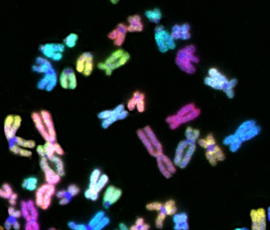Queen Mary academic named Chief Scientist for Genomics England
Professor Mark Caulfield, Director of the William Harvey Research Institute at Queen Mary, University of London, has been named as the Chief Scientist of Genomics England – the company launched by the government today to drive forward the introduction of high-tech DNA mapping.

Multi-colour fluorescent labelled human DNA packaged in chromosomes. Image courtesy of Professor Denise Sheer.
In December Prime Minister David Cameron announced that the personal DNA code – known as a genome – of up to 100,000 patients or infections in patients will be sequenced over the next five years. This will improve understanding, leading to better and earlier diagnosis and personalised care.
Genomics England, a not-for-profit company entirely owned by the Department of Health (DH), will run this project which will initially prioritise sequencing of lung and paediatric cancer, rare diseases and infectious diseases.
Professor Caulfield, who is also head of the Barts National Institute for Health Research Biomedical Research Unit, said: “I am delighted and deeply honoured to take up the post of Chief Scientist for this ambitious programme that will sequence the whole genome of 100,000 people.
“This offers the NHS the real prospect of transforming our application of genomics to aid diagnosis and treatment of rare inherited disorders, common cancers and infectious disease.”
Announcing the launch of Genomics England today, Health Secretary Jeremy Hunt said:
“The NHS has a long track record as a leader in medical science advances and it must continue to push the boundaries by unlocking the power of DNA data.
“The UK aims to become the first country to introduce this technology in its mainstream health system - leading the global race for better tests, better drugs and above all better, more personalised care to save lives.
“Genomics England will provide the investment and leadership needed to dramatically increase the use of this technology and drive costs down.”
Up to £100 million of funding pledged by the government will:
• train a new generation of British genetic scientists to develop life-saving new drugs, treatments and scientific breakthroughs;
• train the wider healthcare community to use the technology;
• fund the initial DNA sequencing for cancer and rare and inherited diseases; and
• build the secure NHS data linkage to ensure that this new technology leads to better care for patients.
Genomics England will manage contracts for specialist UK companies, universities and hospitals to supply services on sequencing, data linkage and analysis. It will set standards for obtaining patient’s consent and also strictly manage storage of personal data in accordance with existing NHS rules designed to securely protect patient information.
It is estimated that one in seventeen people are born with or develop a rare disease during their lifetime. At least 80 per cent of rare diseases have an identified genetic component, with 50 per cent of new cases of rare diseases being identified in children. However it can take considerable time and expense between a patient first presenting at a doctors and receiving an accurate diagnosis. The time taken to sequence a whole human genome has been reduced to one to two weeks and will become more affordable for routine use as the price continues to fall.
Through partial sequencing in research projects of affected children or in infections, such as HIV, TB and Hepatitis C, scientists are already on the way to developing more effective treatments that personalise care.
Genomics England will be funded by DH in the medium term, and any revenue will be invested back into improving health. It will be chaired by former chair of the Medical Research Council, Sir John Chisholm.
Professor Caulfield's role is a secondment and the role is for two days a week.
Related items

11 December 2024

5 December 2024

2 December 2024